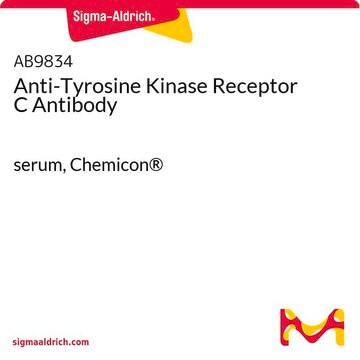05-599
Anti-E1A (Ad2/Ad5) Antibody, clone M73
clone M73, Upstate®, from mouse
Sign Into View Organizational & Contract Pricing
All Photos(1)
About This Item
UNSPSC Code:
12352203
eCl@ss:
32160702
NACRES:
NA.41
Recommended Products
biological source
mouse
Quality Level
antibody form
purified immunoglobulin
antibody product type
primary antibodies
clone
M73, monoclonal
species reactivity
human
manufacturer/tradename
Upstate®
technique(s)
immunocytochemistry: suitable
immunoprecipitation (IP): suitable
western blot: suitable
isotype
IgG2aκ
NCBI accession no.
shipped in
wet ice
target post-translational modification
unmodified
Specificity
three adenovirus (Ad) 2 and 5 E1A gene products
Immunogen
trpE-Ad2 E1A fusion protein isolated from E. coli
Application
Detect E1A (Ad2/Ad5) with Anti-E1A (Ad2/Ad5) Antibody, clone M73 (Mouse Monoclonal Antibody), that has been shown to work in IP, WB, ICC.
Research Category
Epigenetics & Nuclear Function
Epigenetics & Nuclear Function
Research Sub Category
Transcription Factors
Transcription Factors
Quality
routinely evaluated by immunoblot on in RIPA lysates from HEK293 cells
Target description
36-50kDa
Physical form
0.05M sodium phosphate, pH 7.4, 0.1% sodium azide and 0.2% gelatin
Format: Purified
Protein A chromatography
Storage and Stability
1 year at 4°C
Legal Information
UPSTATE is a registered trademark of Merck KGaA, Darmstadt, Germany
Disclaimer
Unless otherwise stated in our catalog or other company documentation accompanying the product(s), our products are intended for research use only and are not to be used for any other purpose, which includes but is not limited to, unauthorized commercial uses, in vitro diagnostic uses, ex vivo or in vivo therapeutic uses or any type of consumption or application to humans or animals.
Not finding the right product?
Try our Product Selector Tool.
Storage Class Code
12 - Non Combustible Liquids
WGK
nwg
Flash Point(F)
Not applicable
Flash Point(C)
Not applicable
Certificates of Analysis (COA)
Search for Certificates of Analysis (COA) by entering the products Lot/Batch Number. Lot and Batch Numbers can be found on a product’s label following the words ‘Lot’ or ‘Batch’.
Already Own This Product?
Find documentation for the products that you have recently purchased in the Document Library.
David F Bodenstein et al.
Stem cell research & therapy, 14(1), 202-202 (2023-08-15)
Mitochondrial dysfunction is involved in several diseases ranging from genetic mitochondrial disorders to chronic metabolic diseases. An emerging approach to potentially treat mitochondrial dysfunction is the transplantation of autologous live mitochondria to promote cell regeneration. We tested the differential filtration-based
Positive and negative effects of adenovirus type 5 helper functions on adeno-associated virus type 5 (AAV5) protein accumulation govern AAV5 virus production.
Nayak, R; Pintel, DJ
Journal of virology null
E Harlow et al.
Journal of virology, 55(3), 533-546 (1985-09-01)
Hybridomas secreting monoclonal antibodies specific for the adenovirus early region 1A (E1A) proteins were prepared from BALB/c mice immunized with a bacterial trpE-E1A fusion protein. This protein is encoded by a hybrid gene that joins a portion of the Escherichia
Eiji Toyoda et al.
Journal of experimental & clinical cancer research : CR, 27, 30-30 (2008-08-23)
To develop a novel therapeutic strategy for human pancreatic cancer using a midkine promoter-based conditionally replicating adenovirus. We examined midkine mRNA expression and midkine protein expression by seven human pancreatic cancer cell lines (AsPC-1, BxPC-3, CFPAC-1, HPAC, MIAPaCa-2, PANC-1, and
Vibhu Prasad et al.
ACS infectious diseases, 3(6), 398-405 (2017-04-25)
Human adenoviruses (HAdVs) infect respiratory, gastrointestinal, and urinary tracts and give rise to eye infections and epidemic keratoconjunctivitis (EKC). They persist in lymphoid tissue and cause morbidity and mortality in immunocompromised people. Treatments with significant postexposure efficacy are not available.
Our team of scientists has experience in all areas of research including Life Science, Material Science, Chemical Synthesis, Chromatography, Analytical and many others.
Contact Technical Service







